Gallery
- Oil consumption per day by region from 1980 to 2006
- Biodiversity hotspots
This page has a list of articles related to environmental history, the study of human interaction with the natural world over time.

The history of the petroleum industry in the United States goes back to the early 19th century, although the indigenous peoples, like many ancient societies, have used petroleum seeps since prehistoric times; where found, these seeps signaled the growth of the industry from the earliest discoveries to the more recent.
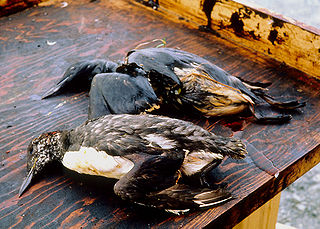
An environmental disaster or ecological disaster is defined as a catastrophic event regarding the natural environment that is due to human activity. This point distinguishes environmental disasters from other disturbances such as natural disasters and intentional acts of war such as nuclear bombings.
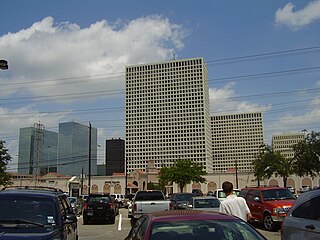
Transocean Ltd. is an American drilling company. It is the world's largest offshore drilling contractor based on revenue and is based in Vernier, Switzerland. The company has offices in 20 countries, including Canada, the United States, Norway, United Kingdom, India, Brazil, Singapore, Indonesia, and Malaysia.

Anadarko Petroleum Corporation was a company engaged in hydrocarbon exploration. It was organized in Delaware and headquartered in two skyscrapers in The Woodlands, Texas: the Allison Tower and the Hackett Tower, both named after former CEOs of the company. In 2019, the company was acquired by Occidental Petroleum.
The natural environment, commonly referred to simply as the environment, is all living and non-living things that occur naturally on Earth or some part of it. This includes complete ecological units that function as natural systems without massive human intervention, including all vegetation, animals, microorganisms, rocks, atmosphere and natural phenomena that occur within their boundaries. And it includes universal natural resources and physical phenomena that lack clear-cut boundaries, such as air, water, and climate, as well as energy, radiation, electric charge, and magnetism, not originating from human activity.

Deepwater Horizon was an ultra-deepwater, dynamically positioned, semi-submersible offshore drilling rig owned by Transocean and operated by BP. On 20 April 2010, while drilling at the Macondo Prospect, a blowout caused an explosion on the rig that killed 11 crewmen and ignited a fireball visible from 40 miles (64 km) away. The fire was inextinguishable and, two days later, on 22 April, the Horizon sank, leaving the well gushing at the seabed and creating the largest marine oil spill in history.
Deepwater drilling, or deep well drilling, is the process of creating holes in the Earth's crust using a drilling rig for oil extraction under the deep sea. There are approximately 3400 deepwater wells in the Gulf of Mexico with depths greater than 150 meters.

BP p.l.c. is a British multinational oil and gas company headquartered in London, England. It is one of the oil and gas "supermajors" and one of the world's largest companies measured by revenues and profits. It is a vertically integrated company operating in all areas of the oil and gas industry, including exploration and extraction, refining, distribution and marketing, power generation, and trading.
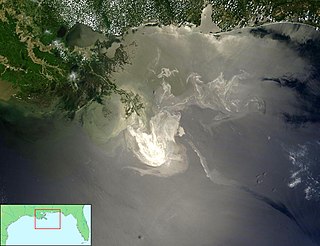
The Deepwater Horizon oil spill was an environmental disaster which began on 20 April 2010, off the coast of the United States in the Gulf of Mexico on the BP-operated Macondo Prospect, considered the largest marine oil spill in the history of the petroleum industry and estimated to be 8 to 31 percent larger in volume than the previous largest, the Ixtoc I oil spill, also in the Gulf of Mexico. Caused in the aftermath of a blowout and explosion on the Deepwater Horizon oil platform, the United States federal government estimated the total discharge at 4.9 MMbbl. After several failed efforts to contain the flow, the well was declared sealed on 19 September 2010. Reports in early 2012 indicated that the well site was still leaking. The Deepwater Horizon oil spill is regarded as one of the largest environmental disasters in world history.

On April 20, 2010, an explosion and fire occurred on the Deepwater Horizon semi-submersible mobile offshore drilling unit, which was owned and operated by Transocean and drilling for BP in the Macondo Prospect oil field about 40 miles (64 km) southeast off the Louisiana coast. The explosion and subsequent fire resulted in the sinking of the Deepwater Horizon and the deaths of 11 workers; 17 others were injured. The same blowout that caused the explosion also caused an oil well fire and a massive offshore oil spill in the Gulf of Mexico, considered the largest accidental marine oil spill in the world, and the largest environmental disaster in United States history.

Offshore oil spill prevention and response is the study and practice of reducing the number of offshore incidents that release oil or hazardous substances into the environment and limiting the amount released during those incidents.
Following is a Timeline of the Deepwater Horizon oil spill for May 2010.
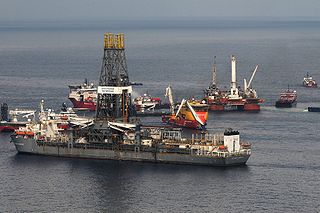
Reactions to the Deepwater Horizon oil spill from various officials and interested parties ranged from blame and outrage at the damage caused by the spill, to calls for greater accountability on the part of the U.S. government and BP, including new legislation dealing with preventative security and clean-up improvements.

Water pollution in the United States is a growing problem that became critical in the 19th century with the development of mechanized agriculture, mining, and industry, although laws and regulations introduced in the late 20th century have improved water quality in many water bodies. Extensive industrialization and rapid urban growth exacerbated water pollution as a lack of regulation allowed for discharges of sewage, toxic chemicals, nutrients and other pollutants into surface water.
The Back to Work Coalition is a group of twelve offshore oil and gas industry stakeholders and trade associations, that have banded together to oppose the federal and regulatory policies placed on the industry following the Deepwater Horizon oil well explosion of April 2010. After the explosion, the Obama administration imposed a federal moratorium on deepwater drilling that lasted through mid-October 2010. The Back to Work Coalition was created in December 2010 to combat what the members believe is a "de facto" moratorium, caused by the federal government's hesitance in issuing drilling permits on the gulf's Outer Continental Shelf (OCS). The coalition was founded by Louisiana Department of Natural Resources (DNR) Secretary Scott Angelle. The coalition is facilitated by the Gulf Economic Survival Team (GEST), a non-profit organization created to restore Louisiana's economy following the moratorium.
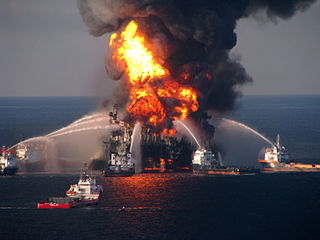
Energy resources bring with them great social and economic promise, providing financial growth for communities and energy services for local economies. However, the infrastructure which delivers energy services can break down in an energy accident, sometimes causing considerable damage. Energy fatalities can occur, and with many systems deaths will happen often, even when the systems are working as intended.
The following outline is provided as an overview of and topical guide to environmentalism:

The RESTORE Act is a United States federal statute that was signed into law by President Barack Obama on July 6, 2012. It was enacted by the 112th United States Congress as an amendment of the Moving Ahead for Progress in the 21st Century Act (MAP-21), a transportation bill that included many other provisions. The act was in response to the Deepwater Horizon oil spill that occurred on April 20, 2010, which caused significant environmental, ecological, and economic damage to the U.S. Gulf Coast.